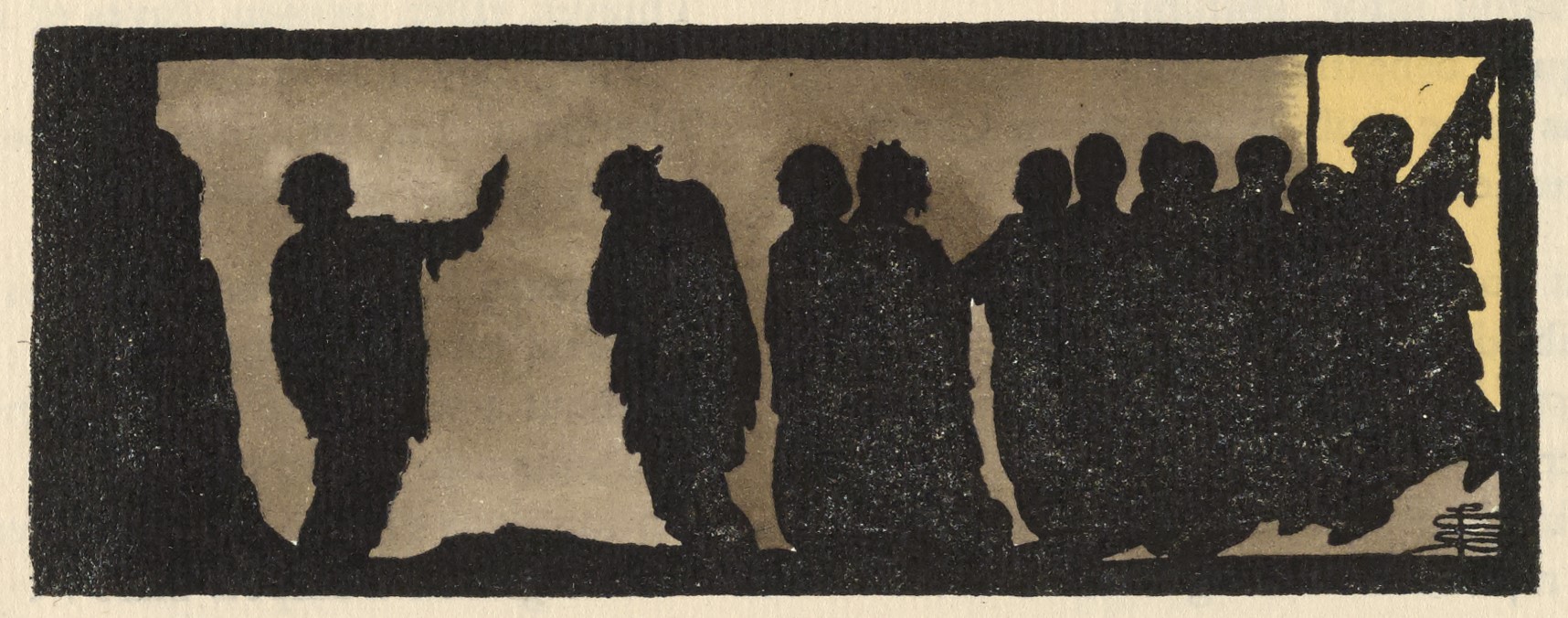A BALLAD OF A NIGHT REFUGE.
(To MAXIM GORKY.)
Night after night, below the street,
We sank into the dark;
A company of wretched souls,
Bearing one fearful mark—
The sign of the ashes and the dust
That choke the heavenly spark.
And those of us who rose at morn,
And crept into the light,
Were dazed and angered by the world—
Better the impure night,
When clouds of smoke and brandy fumes
Deadened our anguished sight;
And through the gloom distorted shapes
Wrangled and cursed and cried,
Or, with gross jest and devilish sneer,
Called on the Christ who died;
While all the time their wretched state
Did their poor vice deride.
Creatures that once were men, we loathed
To look upon the sun—
The sun’s no friend to sores and dirt;
Our rags of gray and dun
Took on some grace in that foul place
Where night and day are one . . .
Those at the bottom have their pride,
Those at the bottom know
That nimble air and sunshine fair
Abhor the sons of woe.
And those who from the darkness come
Must back to darkness go.
Down to our sordid deeps one night
A tramp, a stranger came;
He slipped upon the rotting steps—
He happened to be lame—
And fell headlong—we yelled with mirth;
A cripple is fair game!
And he laughed too, but now the sound
Was that you hear above,
When lovers dance to violins,
And laugh because they love.
In dull surprise, with drink-dimmed eyes
We stared—not one could move.
He seemed as wretched as we all,
The bottom his right place,
Yet he was gay as June and Day,
Like the blue sky his face;
His glance was clear as one who sees
Horizons far in space.
The Green Sheaf
He said that he had tramped the roads,
The roads that have no end,
Until his feet were past the power
Of God or man to mend;
Nor could he find, he said, a king,
With a prancing horse to lend!
Like rain upon our sullen souls
His gentle story fell—
Thief, baron, actor, anarchist
Sat quiet beneath his spell—
Quiet as those souls in pain when Christ
Descended into hell.
Nor did you hear or flout or jeer,
Or ribald laugh upraised;
“What you believe, that alone is,”
He cried—we sat amazed,
While he described the righteous land,
And rapt before him gazed.
“’Tis far from men who sow and reap.
This dear, this righteous land;
It is not marked on any map,
No ship has touched its strand:
Yet can I show its beauty now,
Its wealth ye may command.
“We do not dream—a heavenly stream,
Where drunkards drink, and straight
Their wasted years are given back,
Once more they’re at the gate
Of hope, of fame—once more their name
Burns on the angels’ slate.
“A robe of white, a seamless robe
Worn once, makes bodies fair
That here were spoiled by dirt and lust—
The body’s leprous snare:
As light as ghosts, as sweet as flowers,
They walk in beauty there.
“In righteous land there are no laws,
No prisons, and no gold;
No kings—our crowns are broken hearts—
Good is not bought and sold;
But men all learn to love and give,
Then all their life is told.”
Pale as the moon-white hosts of death,
They rose up from the ground—
Thieves, fallen women, slaves of drink,
They moved as in a swound,
They moved as though to hidden flutes—
Slowly they gathered round.
And gazed in his enraptured eyes;
Then, turning, left him there;
Without a word, the ghastly herd
Climbed to the upper air.
On ramparts dim of highest heaven,
The golden trumpets blare . . .
The Baron smiled his mystic smile,
Held up his thin white hand:
“With lie divine you catch the weak
They seek your Righteous Land,
And find Asylums, Prisons, Homes,
Rescue—best Christian brand.
“Feed them with lies, for lies bring dreams,
And flaming reveries;
But so you may not feed the strong.
Who read with bitter eyes
The brutal truth, and lose the wings
That bear to Paradise.”
. . . And now was hurled from the outer world
A sudden blast of noise,
Four men in black, all spick and span,
With lamps and steely toys,
Came over the rim of the cellar dim—
. . A savage “All right, boys”—
The Green Sheaf
A sickening clap of an iron trap,
The jingling of a chain,
That lame, frail man is prisoned fast
By four men, strong and sane.
Four men must bind his delicate hands,
And give his body pain.
In his jacket strait, he is dragged away—
He draws a shuddering breath—
Like worlds on fire his lonely eyes—
As with gasping sigh, he saith:—
“The weak have faith, the weak have dreams . . .
The strong have only death!”
Petersburg, 19—
Christopher St. John.
MLA citation:
St. John, Christopher. “A Ballad of a Night Refuge,” illustrated by Pamela Colman Smith. The Green Sheaf, No. 3, 1903, pp. 10-12. Green Sheaf Digital Edition, edited by Lorraine Janzen Kooistra, Yellow Nineties 2.0, Toronto Metropolitan University Centre for Digital Humanities, 2022. https://1890s.ca/GSV3-st-john-ballad/
